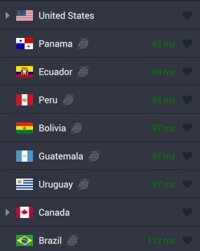Earlier this year I watched the documentary “Citizen Four” about Edward Snowden’s revelations on government spying. Unlike any other documentary I’ve seen, this one had me on the edge of my seat, feeling tense, shocked, and violated all at the same time. Though I have no illegal activities to hide, I can not be comfortable with the level of access the spying agencies have to our computers, cellphones, and other connected devices. Also, the increase of private spying (hacking) is so rampant, it seemed that protection from agency spying might also be increased protection from hacking.
I decided to step up my game and see if I could maintain privacy in this Orwellian environment. A month of research later, I came up with a solution – VPN. A VPN, or Virtual Private Network – encrypts all your traffic between your device and the VPN server. Here is an example scenario of a regular connection vs a VPN connection:
Scenario: Regular Connection VS VPN
-You and I are at a mom and pop ice cream store
-We are both on our iPhones using the FREE WiFi
-mom and pop have a son with ambitions to be the next “Mr Robot” super hacker
-son set up the FREE WiFi network we are using
-son has taught himself enough Linux and Network Administrator skills to Port Scan, Traffic Sniff, and see everything you are doing on his network (urls, IMs, emails, and more)
-son can NOT see what I’m doing. All he can see is encrypted chunks of data going back and forth to one location, which he can not decrypt
This is VPN. All my data – including URLS, requests, responses, etc – flow through a server in an encrypted connection. When I visit a web page, the url is part of the encrypted data between me and the VPN server, which handles the request to that web page. “Son”, or anyone between me and the VPN (like my internet provider) can not see what pages I visit or what is in my data.
Not All VPN’s are Safe
So what if the VPN provider decides to spy on me? Or logs all my traffic and uploads it to the N.S.A. ? This was something I dug deeper into in my research. My wish list for a VPN service provider evolved into this:
– no logging of my data
– good encryption
– good performance ( bandwidth )
– useable on my computers, phones, tablets (and all at the same time)
– decent price
– good reputation for privacy and reliability
I had VPN connections before with my work, but real privacy is something you have to pay for. On a company VPN, the company can still see your unencrypted traffic, because they operate the VPN server.
Speed
My final choice was Private Internet Access ( which I’ll refer to as PIA ). I have it set up on my Mac, PC, iPhone, Android, and Linux box. You can see PIA’s supported clients here. When not using VPN, I can download up to 12 Megabytes per second on my 100 Megabit connection. On the VPN I’ve reached up to 4 Megabytes per second, but typically cap around 2. These are good speeds considering that the VPN provider has to service many other individuals simultaneously. This is also more than fast enough for YouTube and other video streaming.

Geolocation
I have a choice of servers all over the country and all over the world. This gives me better connections where ever I am, but also allows me to “be” in other places when I need to be. For example, when in Canada, certain web sites re-direct you to the Canadian .ca versions of the page. Your IP location is used for redirection behind the scenes. On PIA, I simply connect to a US VPN server and the problem is solved. This could also hold true for people in countries with censorship and other restrictions, as the agencies blocking certain URLs and IP addresses would never see them in the encrypted VPN traffic.
Hacker Proof?
Other than being digitally safe in the ice cream shop, and being able to spoof my location, VPN has other advantages. My true IP address is never revealed when I surf the internet on VPN. If a hacker was trying to get to my computer via internet, my IP address would appear as one of PIA’s VPN servers. Getting back to my computer via internet should technically be impossible. Although there may be other ways hackers can get to your computer, blocking the passage through the internet is a big step toward safety.

